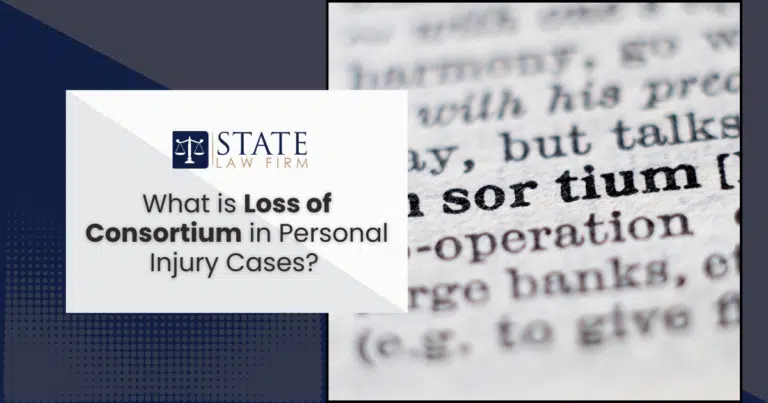When a personal injury disrupts more than just the injured individual’s life, the ripple effects can profoundly impact their loved ones. Among the legal remedies available in such situations is a claim for loss of consortium, which seeks compensation for the emotional, relational, and often financial toll borne by family members. Loss of consortium is a critical yet sometimes misunderstood aspect of personal injury law, especially in cases involving severe injuries.
The importance of recognizing these claims is underscored by the fact that over 40% of families report significant emotional and financial strain following a serious injury to a loved one (source). These claims can provide much-needed relief for spouses and family members grappling with the aftermath of an accident.
At State Law Firm, our boutique personal injury team in Sherman Oaks is dedicated to supporting clients through challenging cases. With a focus on evolving into litigators who take on tougher claims, we bring a personalized approach to every case. If you’re navigating the legal complexities of a personal injury, our Sherman Oaks premises liability lawyers are here to help you understand your rights and options (learn more).
Defining Loss of Consortium: A Key Concept in Personal Injury Law
At its core, loss of consortium refers to the deprivation of the benefits of a family relationship due to injuries caused by someone else’s negligence. Most commonly, it applies to spousal relationships, recognizing the emotional, physical, and financial bonds that an injury can strain or sever.
Loss of consortium claims focus on non-economic damages, which can include:
- Emotional support: The loss of companionship, affection, and guidance.
- Intimacy and physical relationship: The inability to maintain physical closeness or sexual intimacy.
- Daily contributions: A partner’s loss of shared responsibilities, such as household chores or caregiving.
These claims underscore the recognition in personal injury law that the impact of an injury extends beyond the individual and touches those closest to them. Pro Tip: To establish the strongest claim, it’s crucial to document how the injury has specifically altered the relationship dynamic, as this will play a pivotal role in your case.
The Elements Required to Prove Loss of Consortium Claims
Proving a loss of consortium claim requires more than demonstrating the existence of an injury—it involves illustrating how the injury has fundamentally disrupted the relationship. To build a solid case, the following elements must typically be established:
- A valid relationship: Most commonly, this means a legal marriage, but some jurisdictions may extend eligibility to domestic partners or close family members.
- Injury due to negligence: The injured party must have sustained harm caused by someone else’s negligent or intentional act.
- Impact on the relationship: Evidence must show how the injury has led to the loss of affection, companionship, or intimacy.
Key Evidence to Support a Claim
- Testimony from both partners or family members about the emotional and relational impact.
- Medical records detailing the extent of the injury and its effects on daily life.
- Expert witness reports, such as psychologists or marriage counselors, providing insight into the relationship strain.
Pro Tip: Consult with an attorney early to ensure the proper documentation is collected. A well-prepared claim often includes a mix of personal testimony and expert evidence to paint a full picture of the impact.
Who Can File a Loss of Consortium Claim? Exploring Eligibility Criteria
While loss of consortium claims are most commonly filed by spouses, eligibility can vary based on jurisdiction. Generally, eligible parties include:
- Spouses: The most common claimants, as the spousal relationship often bears the brunt of an injury’s impact.
- Domestic partners: In states recognizing domestic partnerships, these individuals may also be eligible.
- Children or parents: Some jurisdictions may allow close family members to file claims if the injury disrupts their ability to maintain a significant relationship with the injured party.
Navigating eligibility requirements can be complex, and it’s essential to work with a knowledgeable attorney to determine your rights. At State Law Firm, we help families explore their options and guide them through the legal process with care and expertise.
The Emotional and Financial Impacts of Loss of Consortium on Families
The effects of an injury extend far beyond physical pain. For families, loss of consortium can lead to:
- Emotional strain: Injuries often disrupt communication, intimacy, and shared experiences, creating emotional rifts.
- Financial challenges: If the injured party was a primary caregiver or income earner, families may face unexpected financial burdens.
- Disrupted support systems: Loved ones often lose the mutual encouragement and partnership they relied on before the injury.
Families grappling with these challenges deserve to have their voices heard and their losses recognized. Loss of consortium claims not only provide financial compensation but also validate the profound emotional toll these injuries impose.
Pro Tip: To maximize compensation, include detailed evidence of financial hardships, therapy expenses, or household adjustments required due to the injury.
The Legal Process: How to File a Loss of Consortium Claim Successfully
Filing a successful loss of consortium claim involves navigating several key steps:
- Consult with an attorney: An experienced lawyer can evaluate the details of your case and determine the viability of a claim.
- Gather evidence: Documentation of the injury, relationship changes, and expert testimony are essential to building a strong case.
- File the claim: Loss of consortium claims are often included as part of the broader personal injury lawsuit.
- Prepare for negotiation or trial: Many claims are settled out of court, but having an attorney prepared to litigate can ensure your interests are protected.
At State Law Firm, we understand that every family’s situation is unique. Our attorneys are committed to helping clients navigate these emotionally charged cases with compassion and precision.
This comprehensive guide highlights the importance of loss of consortium claims and the steps required to pursue them successfully. If you’re ready to learn more about your rights or need personalized guidance, our team at State Law Firm is here to help.


